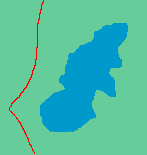Fishing
- Possession and Transport of Exotic Aquatic Species
- Licenses & Regulations
- ShareLunkers
- Fish Identification
- Fish Consumption
- Texas Freshwater Fisheries Center
Water Resources
- Texas Reservoir Levels
- US Army Corps of Engineers
- Texas Water Issues
- Golden Alga
- Aquatic Vegetation
900 CR 218
Brookeland, Texas 75931
(409) 698-9114
Dan Ashe, Biologist
Nearby State Park
Timpson Reservoir
Quick Links: Fishing Regulations | Angling Opportunities | Cover & Structure | Tips & Tactics
Lake Characteristics
Location: Four miles northeast of Garrison
off US 59
Surface area: 223 acres
Maximum depth: 35 feet
Impounded: 1956
Water Conditions
Current
Lake Level: Shelby County Freshwater Supply District (936) 254-3388
Conservation Pool Elevation: 292 ft. msl
Fluctuation: 1-3 feet annually
Normal Clarity: Clear
Reservoir Controlling Authority
Shelby County Freshwater Supply District
PO Box 106
Timpson, Texas 75972
(936) 254-2421
Aquatic Vegetation
Primarily native emergent vegetation
Predominant Fish Species
Lake Records
Stocking History
Latest Survey Report
Lake Maps
Available from controlling authority
Fishing Regulations
This reservoir has special regulations on some fishes. See bag and size limits for this lake.
Angling Opportunities
The most popular game fish at Timpson Reservoir is the largemouth bass. Numbers of bass are relatively high and an excellent fishery exists. Due to the 14-21 inch slot limit, Timpson produces a good number of trophy-sized bass. Crappie and catfish are present in the reservoir, but numbers are relatively low and few anglers target these species. Bluegill and redear sunfish provide fair fishing, especially for youth or inexperienced anglers.
| Species | Poor | Fair | Good | Excellent |
|---|---|---|---|---|
| Largemouth Bass | ||||
| Catfish | ||||
| Crappie | ||||
| Sunfish |
Fishing Cover/Structure
Habitat in Timpson Reservoir consists of standing timber, boat docks, and emergent vegetation. Game fish are typically found around vegetation edges, points, boat docks, and creek channels.
Tips & Tactics
Anglers are most successful at catching largemouth bass during the fall, winter, and spring months. Due to cooler water temperatures, fish are active for longer periods of the day and are typically found in shallow water. A variety of baits and techniques will work during these times. When fish are active, crankbaits and spinnerbaits will catch bass. During the hot summer, the bite slows and fish activity is usually concentrated during early morning, late evening, and at night. Poppers, propeller baits, and stickbaits are good topwater choices during low light conditions. As the sun rises, most bass are concentrated around boat docks and deep creek channel ledges. During this time, plastic worms and jigs are the preferred baits. Sunfish, especially bluegill and redear sunfish, can be caught year-round but fishing peaks during the late spring or summer when fish are on their spawning beds. Small jigs, spinners, and crickets all catch sunfish.
